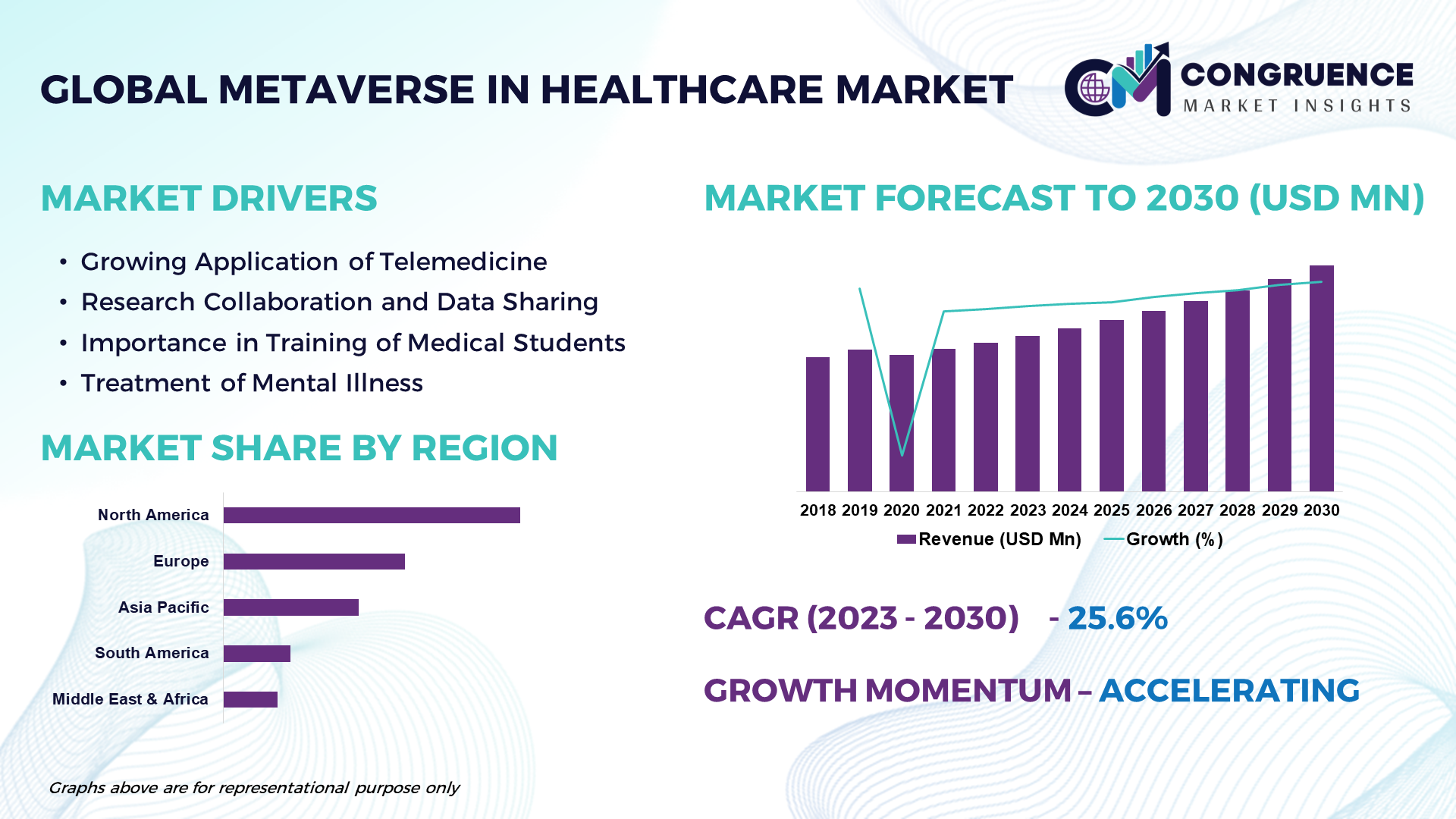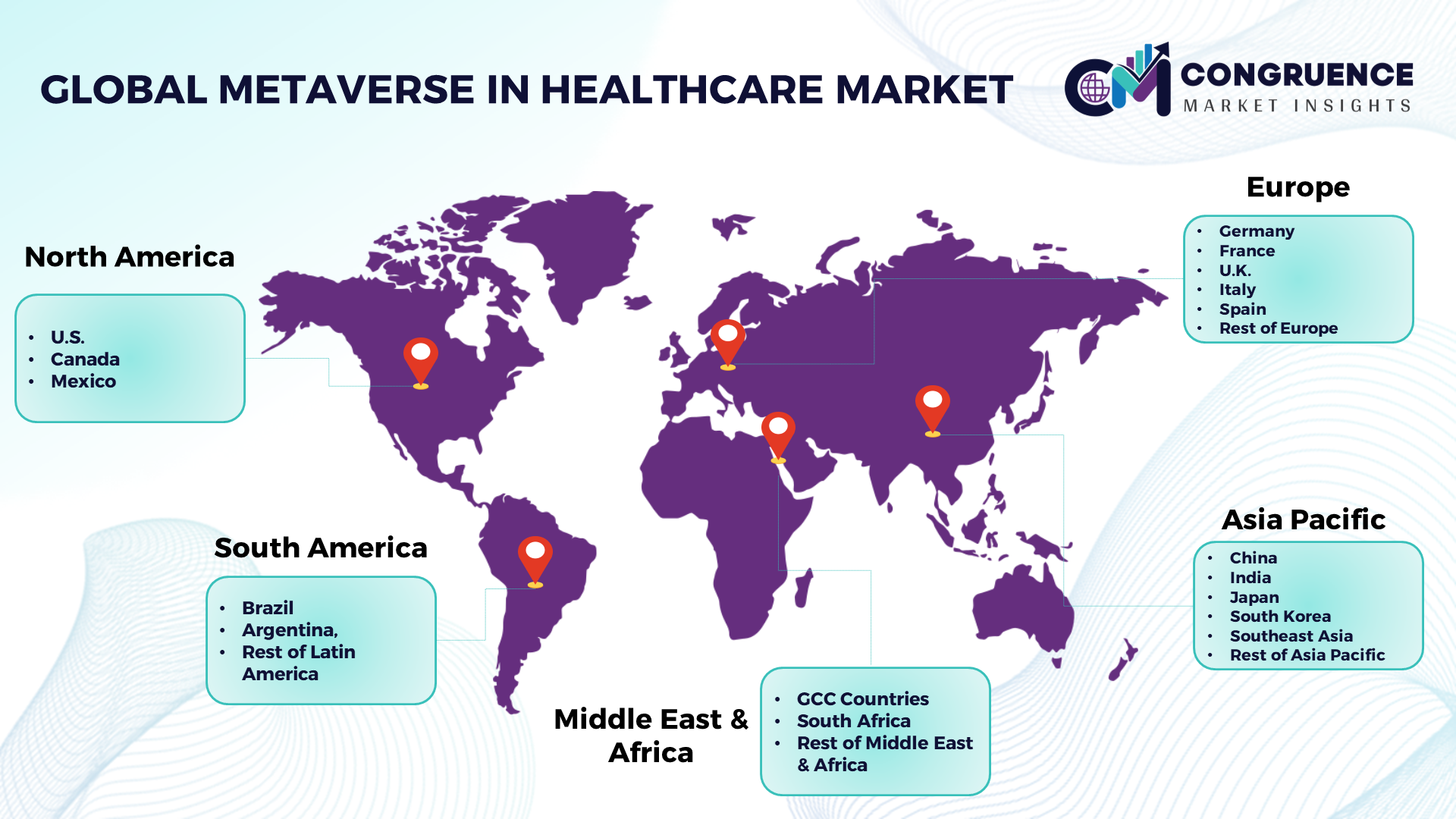Reports
The Global Metaverse in Healthcare Market is expected to expand at a CAGR of 25.6% between 2023 and 2030. The huge digital cosmos known as the metaverse coexists with the physical world. All of the virtual worlds that individuals can engage with, socialize in, play games, and shop in make up the metaverse. In the metaverse (VR), three key technological trends, i.e. intellectual (AI), augmented reality (AR), and virtual reality (VR), converge. When combined, they have the potential to open up whole new treatment options, reduce expenses, and significantly improve patient outcomes. This emerging idea will take on many new forms as major social players incorporate different aspects of virtual reality and immersive experiences from multiple angles. It will be an excellent tool for educating, empowering, and providing happy experiences for both patients and healthcare practitioners in the healthcare sector. The world of augmented reality, complete with ridiculous headgear and sci-fi asides, is poised to completely transform the way that patients receive care. Similar to how robotic surgery has previously used augmented reality, complex surgeries are now expected to do the same. Physicians and specialists use virtual reality as a teaching tool for other medical professionals.

Metaverse in Healthcare Market Major Driving Forces
Telemedicine: Telemedicine’s application has grown dramatically in recent years. Metaverse will allow for the addition of a virtual office where physicians and patients can consult in any environment, including a 3D clinic, to telemedicine sessions. As a result, it is projected that the teleconsultation services user experience will significantly improve. Through such consultations, patients will no longer be restricted to receive care from specific specialists based on their physical location.
Research Collaboration and Data Sharing: The metaverse offers a platform for seamless data sharing and collaboration between researchers and healthcare practitioners. This quickens the speed of medical research and fosters interdisciplinary collaboration and knowledge exchange. Large datasets can be accessed and analyzed in a virtual environment, which can result in novel findings and breakthroughs in the field of medicine.
Importance in Training of Medical Students: It is necessary to enhance medical education in order to improve patient outcomes due to the appalling condition of the healthcare infrastructure in many countries. The metaverse in the healthcare industry will be driven by augmented reality and virtual reality teaching medical students, interns, and residents difficult surgical procedures with greater precision for better patient outcomes.
Treatment of Mental Illness: Today's busy schedules and robotic lifestyles are contributing to an increase in mental illnesses. The metaverse can be used to treat a variety of mental health conditions, including delusions, PTSD, hallucinations, phobias, and anxiety disorders.
Metaverse in Healthcare Market Key Opportunities
Artificial Intelligence: Artificial intelligence (AI) has the potential to revolutionize the health care industry in a number of ways, including phone answering, medical record review, population health tracking and analytics, therapeutic drug and device design, radiology picture analysis, clinical diagnosis and treatment plan establishment, and more.
Virtual Reality: It can be used to simulate real-world surgeries or to submerge a student inside a human body and present a 3600 view of the patient's condition. It is being used by medical professionals to train other medical professionals, which is expanding the metaverse's business potential in the healthcare industry.
Blockchain Technology: Due to its ability to create democratically run decentralized communities through smart contracts and a record of digital "ownership" of virtual surroundings and even actual goods, blockchain technology is a crucial part of the healthcare metaverse. The management and protection of incredibly important health data is the most well-known use of blockchain in the healthcare sector. This creates further opportunities for the metaverse in healthcare sector.
Metaverse in Healthcare Market Key Trends
· Combine augmented reality (AR) with virtual reality (VR) technologies to create immersive health experiences.
· Creation of telemedicine and virtual clinics inside the metaverse.
· Application of gamification components to improve treatment regimen adherence and patient engagement.
· Use of simulations and digital twins for tailored medical therapies.
· Blockchain technology application for the safe and open metaverse administration of health data.
· AI-powered avatars and virtual health aides are becoming more commonplace for patient support and education.
· Cooperation to increase the range of metaverse healthcare services offered by tech firms, content producers, and healthcare providers.
· Through online therapy sessions and mindfulness exercises, concentrate on mental health and wellness solutions.
· Investigation of online learning platforms for medical education and career advancement.
· Venture capitalists and healthcare organizations are investing more in metaverse healthcare firms and platforms.

Market Competition Landscape
The competitive landscape of the global Metaverse in Healthcare market is characterized by the presence of various players spanning healthcare providers, technology companies, platform developers, and content creators. Key players in the market are actively involved in developing innovative solutions and forging strategic partnerships to gain a competitive edge and expand their market presence. Leading healthcare providers such as Mayo Clinic, Cleveland Clinic, and Johns Hopkins Medicine are leveraging their expertise to create virtual clinics, telemedicine platforms, and immersive healthcare experiences within the metaverse. They collaborate with technology companies and platform developers to integrate advanced technologies such as virtual reality (VR), augmented reality (AR), and artificial intelligence (AI) into their healthcare offerings. Prominent players in the market include:
· Meta Platforms, Inc. (formerly Facebook)
· Microsoft Corporation
· Google LLC
· Mayo Clinic
· Cleveland Clinic
· Johns Hopkins Medicine
· Spatial.io
· AltspaceVR
· Rec Room
· XRHealth
· FundamentalVR
· Osso VR
· AppliedVR
· Virti
· XRHealth
|
Report Attribute/Metric |
Details |
|
Base Year |
2022 |
|
Forecast Period |
2023 – 2030 |
|
Historical Data |
2018 to 2022 |
|
Forecast Unit |
Value (US$ Mn) |
|
Key Report Deliverable |
Revenue Forecast, Growth Trends, Market Dynamics, Segmental Overview, Regional and Country-wise Analysis, Competition Landscape |
|
Segments Covered |
· By Application (Telemedicine & Virtual Consultations, Medical Education & Training, Therapy & Rehabilitation, Healthcare Simulation) · By Technology (Virtual Reality, Augmented Reality, Mixed Reality) · By End User (Hospitals & Clinics, Medical Schools & Training Institutes, Pharmaceutical Companies, Others) |
|
Geographies Covered |
North America: U.S., Canada and Mexico Europe: Germany, France, U.K., Italy, Spain, and Rest of Europe Asia Pacific: China, India, Japan, South Korea, Southeast Asia, and Rest of Asia Pacific South America: Brazil, Argentina, and Rest of Latin America Middle East & Africa: GCC Countries, South Africa, and Rest of Middle East & Africa |
|
Key Players Analyzed |
Meta Platforms, Inc. (formerly Facebook), Microsoft Corporation, Google LLC, Mayo Clinic, Cleveland Clinic, Johns Hopkins Medicine, Spatial.io, AltspaceVR, Rec Room, XRHealth, FundamentalVR, Osso VR, AppliedVR, Virti, XRHealth |
|
Customization & Pricing |
Available on Request (10% Customization is Free) |
